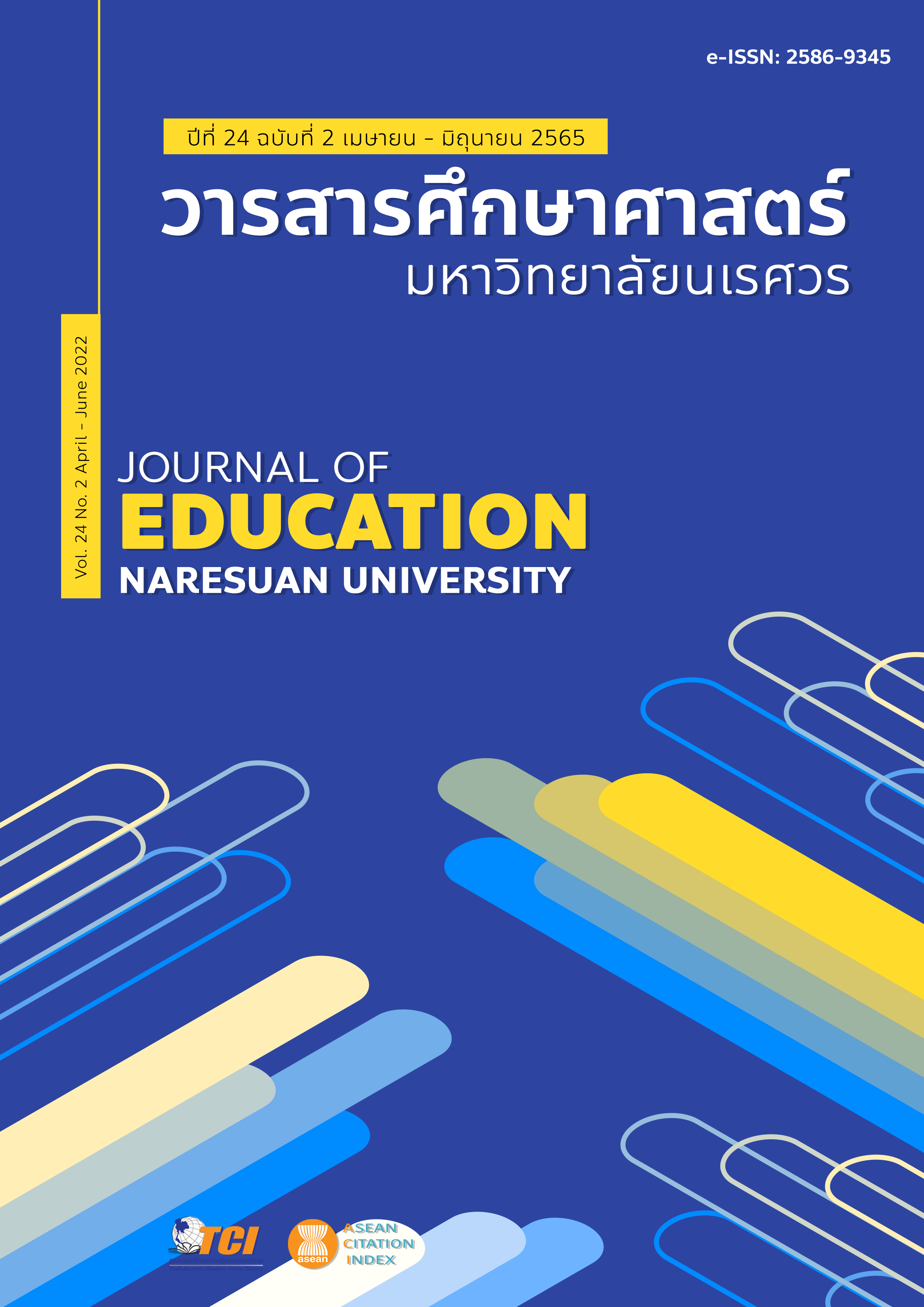DEVELOPMENT OF INDICATORS AND EVALUATION CRITERION FOR IDENTITY OF TEACHER STUDENTS การพัฒนาตัวบ่งชี้และเกณฑ์การประเมินอัตลักษณ์ของนิสิตครู
Main Article Content
Abstract
The purposes of research to develop indicators and evaluation criterion for identity of teacher students. The sample were 420 teacher students in Faculty of Education from all programs in 6 Universities from 6 regions of Thailand using multi-stage random sampling. Data were collected by measurement instrument for identity of teacher students. The data were then analyzed by content validity, discrimination, construct validity, reliability, and T-score. Measurement instrument for identity of teacher students had content validity of 6 dimensions as examined by experts (IOC = .60 - 1.00). the discrimination of 6 dimensions ranged between .275-.856 and reliability coefficients had .927, .942, .879, .927, .919 and .883 respectively. The research findings were as followed:
1. The components for identity of teacher students had 6 dimensions: 1) innovator skills consisted of 4 indicators, 2) digital skills consisted of 3 indicators, 3) English using skills consisted of 4 indicators, 4) entrepreneur skills consisted of 4 indicators, 5) self-directed learning skills consisted of 5 indicators, and 6) physical and mental well-being skills consisted of 4 indicators.
2. 6 dimensions of components had construct validity as shown by the model fit with the empirical data. It had evaluation criterion using cut-off point score of standard T score as follow: 1) innovator skills (T = 40, M = 2.947; T = 50, M = 3.544; T = 60, M = 4.145) 2) digital skills (T = 40, M = 3.361; T = 50, M = 3.941; T = 60, M = 4.522) 3) English using skills (T = 40, M = 1.300; T = 50, M = 2.242; T = 60, M = 3.190) 4) entrepreneur skills (T = 40, M = 3.301; T = 50, M = 3.842; T = 60, M = 4.383) 5) self-directed skills (T = 40, M = 3.161; T = 50, M = 3.717; T = 60, M = 4.275) and 6) physical and mental well-being skills (T = 40, M = 3.361; T = 50, M = 3.958; T = 60, M = 4.556)
Article Details

This work is licensed under a Creative Commons Attribution-NonCommercial-NoDerivatives 4.0 International License.
The owner of the article does not copy or violate any of its copyright. If any copyright infringement occurs or prosecution, in any case, the Editorial Board is not involved in all the rights to the owner of the article to be performed.
References
Canrinus, E. T., Lorenz, M. H., Beijaard, D., Buitink, J., & Hofman, A. (2011). Profiling teachers’ sense of professional identity. Educational Studies, 37(5), 593-608.
Chimthongdee, W. (2014). A causal model of teacher’s innovative ability with creative thinking as the mediator. Bangkok: Chulalongkorn University. [in Thai]
De Bes, F. T., & Kotler, P. (2011). Winning at innovation: The A-to-F model. Basingstoke: Palgrave Macmillan.
Dezuanni, M., Burgess, J., Mitchell, P., Marshall, A., & Cross, A. (2018). Measuring and evaluating digital ability for digital inclusion in Queensland: A report for the Queensland Department of Housing and Public Works. Australia: Queensland University of Technology, Digital Media Research Centre.
Field, T. (2010). Touch for socioemotional and physical well-being: A review. Developmental Review, 30, 367–383.
Lee, C., Yeung, A. S., & Ip, T. (2017). University English language learners' readiness to use computer technology for self-directed learning. System, 67, 99-110.
Media Awareness Network. (2010). Digital literacy in Canada: From inclusion to transformation. Retrieved June 12, 2016, from http://www.ic.gc.ca/eic/site/028.nsf/eng/00454.html
Nilsson, G., Ohrvik, J., Lonnberg, I., & Hedberg, P. (2011). Low psychological general well-being (PGWB) is associated with deteriorated 10-year survival in men but not in women among the elderly. Archives of Gerontology and Geriatrics, 52(2), 167–171.
Soper, D. S. (2021). A-priori Sample Size Calculator for Structural Equation Models. [Software]. Available from http://www.danielsoper.com/statcalc/calculator.aspx?id=89
Tao, Y., Li, L., & Jiang, A. (2015). Development of a nursing education program for improving Chinese undergraduates' self-directed learning: A mixed-method study. Nurse Education Today, 35, 1119–1124.
Thammakorn, P., & Duangjinda, W. (2018). Paths Leading to Success for Entrepreneurs. Technical Education Journal King Mongkut’s University of Technology North Bangkok, 9(1), 256-264. [in Thai]
Thaweetangtrakul, W., Tanpichai, P., & Srisuantang, S. (2014). Factors Affecting to the Identities of Students Majoring in Agricultural and Environmental Education, Kasetsart University. Veridian E-Journal. 7(3), 754-769. [in Thai]
Yurayat, P. (2011). A Study and Development of Psychological well-being of University Students. Bangkok: Srinakharinwirot University. [in Thai]


